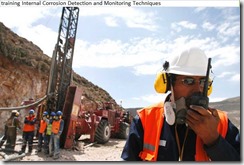TRAINING PRACTICAL INTERNAL CORROSION CONTROL AND MONITORING IN OIL & GAS OPERATIONS DI JAKARTA
TRAINING PRAKTIK PENGENDALIAN DAN PEMANTAUAN KOROSI INTERNAL DALAM OPERASI MINYAK & GAS DI JAKARTA
TRAINING INTERNAL CORROSION CONTROL AS A KEY FACTOR TO PIPELINE INTEGRITY MANAGEMENT DI JAKARTA

Internal Corrosion Problems in Gas, Oil and Produced Water Pipeline and Equipment
* Piping and Pipeline Leakage due to Pitting Corrosion and Microbiological Induced Corrosion
* Severe Pipe Wall Thickness Reduction and Short Remaining Service Life caused by Sour Corrosion
* Pipe Wall, Rotating Parts and Equipment Cracking due to Chloride and Sulfide in the Fluids
* Internal Corrosion of Pipeline and Equipment due to Water in Oil and Oil in Water Emulsions
* Internal Corrosion due to Multi Phase Flow in the Pipeline
* Severe Corrosion Rate caused by CO2 and Hydrate in the Gas Lines, CO2/H2S Removal Unit and Glycol Dehydration Unit
* Internal Corrosion in the Water Lines due to Dissolved Oxygen, Mud and Sludge
* Malfunction of Pump, Compressor, Valves and Equipment due to Under-Deposit Corrosion, Under-Film Corrosion and Fouling
The Nature, Mechanism and Characteristics of Internal Corrosion and the Control Methods
* Anodic-Cathodic Reactions, Electrical Properties and Characteristics of Corrosion Cells
* Physical & Metallurgical Conditions of Metals and Chemical Composition that Promote Corrosion
* Destructive and Catastrophic Effects of Corrosive Agents and Microorganism in the Gas, Oil and Produced Water Fluids
* The Role and Mechanism of O2, CO2, H2S, Dissolved Salts and Microorganism in Internal Corrosion
* The Role of Oilfield Bacteria and the Mechanism of MIC
* Characteristics and Detection of Internal Corrosion in the Pipeline and Surface Equipment
* Removal of Dissolved Corrosive Agents and Non-Hydrocarbon Gases in the Gas, Oil and Produced Water Fluids
* Internal Corrosion Control with On-line Chemical Inhibitors Injection, Surface Barriers and Scavengers
Internal Corrosion Detection and Monitoring Techniques, Devices and Analysis
* Visual Inspection and Early Detection Techniques & Devices for Monitoring Fluid Corrosiveness and Tests for Identifying Corrosion products
* The Important of Internal Corrosion Rate Monitoring Before and After Chemical Injection and Treatment
* NACE Standard Method for Preparation, Installation, Laboratory Analysis and Interpretation of Results of Internal Corrosion Monitoring
* Access Fittings, Retrievers, Corrosion Coupons, Scale Coupons, Corrosion Probes, Holders, Injection & Sampling Devices and Instrument for On-line Internal Corrosion Monitoring
* The Use of Nipple or Spool, Hydrogen Probe and Galvanic Probe
* NACE Standard Method for Testing and Analysis of Bacterial Activity and Microbiological Induced Corrosion
* Iron Content Analysis of Produced Water and the COPRA Correlation
* Down-hole Tubing or Casing Calipers, Ultrasonic Wall Thickness Testers and Radiography
Internal Corrosion Control with Chemical Inhibitor Injection, Passive Film Formation and Biocides
* Nature & Classification of Inhibitors and Effect of Ionic Character on
* Inhibiting Ability
* Formulations of Oilfield Inhibitors and the use of Water Soluble Inhibitors, Volatile Inhibitors and Acid Inhibitors
* Typical Corrosion Inhibitors, Scavengers & Biocides for Oil & Gas Field
* Guidelines of Inhibitor and Biocide Applications and the Chemical Injection Equipment for Pipeline and Surface Facility
* Inhibitor and Biocide Batch Treatment Using Pigs, Chemical Dosage and the Pigging Operations
* Surfactant and Cleaners for Solving Fouling Problem in the Equipment and Systems
* Cationic & Mixed Charge Organic Inhibitors for Hydrocarbon and Oxygen Corrosion Inhibitors for Produced Water
* Testing and Evaluation of Inhibitor and Biocide Effectiveness
* Safety Precaution in Working with Inhibitors and Biocides
Internal Corrosion Control as a Key Factor to Pipeline Integrity Management
* Hazard Assessment and Risk Based Inspection for the Pipeline and Equipment Maintenance Program
* Pipeline Internal Damage Record and Wall Thickness Monitoring
* Pigging for Water and Deposit Removal from the Pipeline System
* Controlling of Flow Stability and Corrosion Rate to a Safe Level
* Estimating Present Pipeline Remaining Service Life
* Evaluation of Present Condition and Comparison with Initial Pipeline Design Baseline
* Evaluation and Controlling of Chemical Inhibitor and Biocide Injection by using Corrosion Rate Monitoring Data.
* Evaluation of Pipeline and Equipment Damage in accordance with Root Cause Failure Analysis
* Development of Specific Pipeline Integrity Management System by using Internal Corrosion Rate Monitoring Data
Lokasi Pelatihan Tahun 2021 :
Yogyakarta, Hotel Dafam Seturan
Jakarta, Hotel Amaris La Codefin Kemang
Bandung, Hotel Grand Serela Setiabudhi
Bali, Hotel Ibis Kuta
Lombok, Hotel Jayakarta
Catatan :
- Waktu pelatihan Dua+1* hari dengan Biaya tersedia untuk Perorangan, Group, dan Inhouse Training, belum termasuk akomodasi/penginapan.
- Untuk biaya dan jadwal training harap menghubungi marketing kembali
Investasi training:
Investasi pelatihan selama dua hari tersebut menyesuaikan dengan jumlah peserta (on call). *Please feel free to contact us.
Apabila perusahaan membutuhkan paket in house training, anggaran investasi pelatihan dapat menyesuaikan dengan anggaran perusahaan.
Fasilitas training:
Free Penjemputan dari bandara ke hotel*.
Modul / Handout.
Flashdisk*.
Certificate of attendance.
FREE Bag or bagpacker.
Training Kit (Photo Documentation, Blocknote, ATK, etc).
2x Coffe Break & 1 Lunch.
Souvenir .






